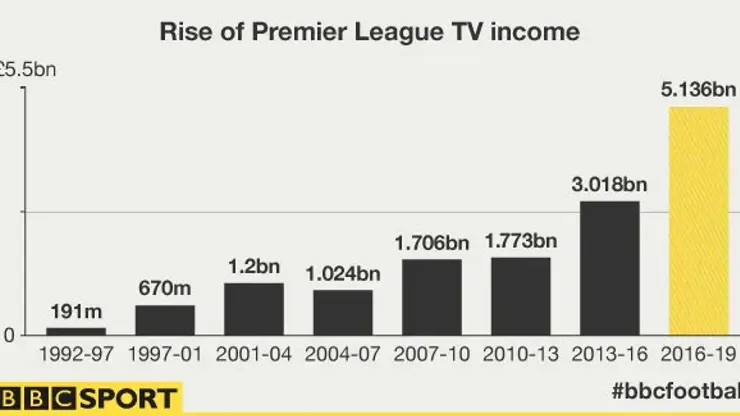Manchester United’s executive vice-chairman Ed Woodward has warned that the staggering 70 per cent rise in domestic Premier League TV rights may not be replicated when the international rights are sold.
Woodward also defended United’s ticket prices after news of the £5.136billion TV deal with Sky and BT Sport for the 2016/17, 2017/18 and 2018/19 seasons led to calls for clubs to slash ticket prices.
The Premier League will start to sell their rights to overseas countries – worth around £2.5billion for the current three-year period – towards the end of the season, but Woodward suggested the fierce competition in the British market had pushed the UK values up.
Woodward, speaking on a conference call to investors after United reported revenues down 14 per cent for the second quarter of their financial year as a result of being absent from the Champions League, said: “We have seen a big uplift in the domestic rights and I’m not sure you should be using that as a guide for something that covers 200 countries around the world. I think there are some specific reasons in the UK market why that has happened.
“A record number of companies requested tender documents and serious interest emerged from several companies, some for the first time. ”
United’s revenues for the three months ending December 31 were £105.7million compared to £122.9million a year ago – but not as great a drop as some analysts had predicted due to a reduction in the club’s costs and a rise in commercial income.
Woodward also acknowledged the news of the £5.136billion TV deal had led to calls to clubs to show restraint in spending the windfall on wages and use the extra money for grassroots football and to make it cheaper for fans.
He added: “We think about ticket pricing carefully every year on a stand-alone basis and we will look at 2016/17 pricing at the appropriate time. We are a club that maybe is in the unique position that we have kept season ticket prices flat for five of the last six years and that our prices are fairly priced compared to the market.”
Woodward said the amount of TV money that would be given out to grassroots football and the Football League would not be decided until 2016 but that under the present deal about 15 per cent of TV revenues were distributed beyond the Premier League.
The biggest impact on United’s finances has been the lack of broadcast income from European football, down 46.9 per cent to £28.4million.
The wage bill has dropped £2.9million over the three months – mainly due to a reduction in the size of the squad compared to last season.
Woodward said the club – currently third in the Premier League table – were well placed to make it back into the Champions League next season.
He added: “Notwithstanding no European football this season, our revenues and EBITDA (earnings before interest, taxes, depreciation and amortization) remain strong and demonstrate the underlying strength of our business model, with commercial revenues up year over year.
“On the pitch, the team is well positioned to challenge for a top-four finish in the Premier League and we look forward to the rest of the season.”
200+ Channels With Sports & News
- Starting price: $33/mo. for fubo Latino Package
- Watch Premier League, Women’s World Cup, Euro 2024 & Gold Cup
The New Home of MLS
- Price: $14.99/mo. for MLS Season Pass
- Watch every MLS game including playoffs & Leagues Cup
Many Sports & ESPN Originals
- Price: $10.99/mo. (or get ESPN+, Hulu & Disney+ for $14.99/mo.)
- Features Bundesliga, LaLiga, Championship, & FA Cup
2,000+ soccer games per year
- Price: $5.99/mo
- Features Champions League, Serie A, Europa League & Brasileirāo
175 Premier League Games & PL TV
- Starting price: $5.99/mo. for Peacock Premium
- Watch 175 exclusive EPL games per season






